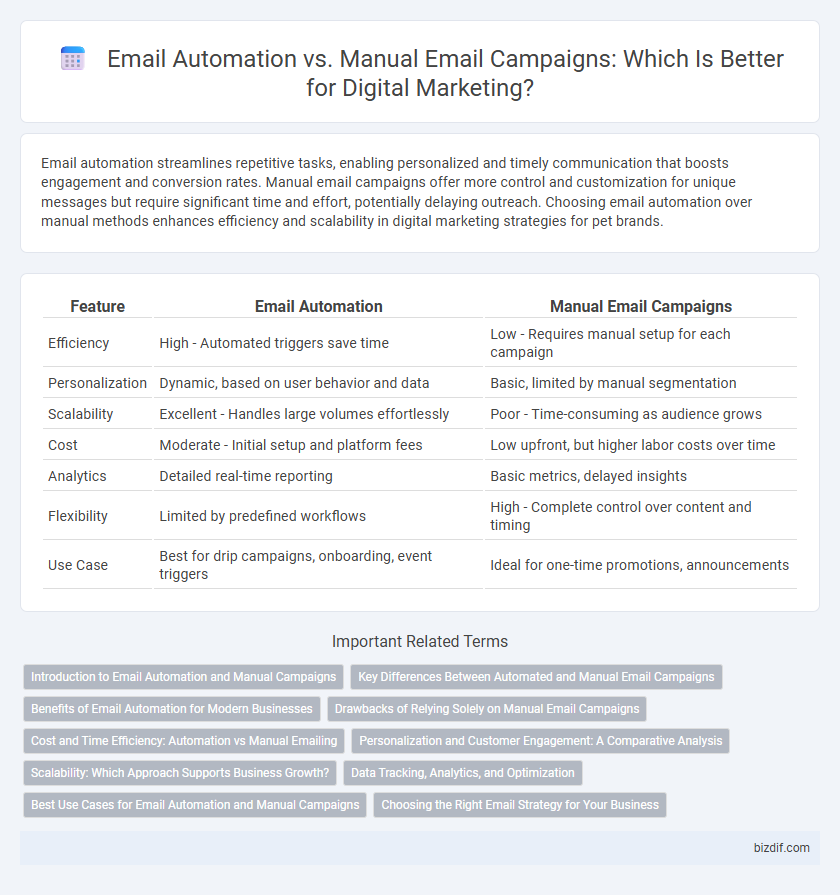Email automation streamlines repetitive tasks, enabling personalized and timely communication that boosts engagement and conversion rates. Manual email campaigns offer more control and customization for unique messages but require significant time and effort, potentially delaying outreach. Choosing email automation over manual methods enhances efficiency and scalability in digital marketing strategies for pet brands.
Table of Comparison
| Feature | Email Automation | Manual Email Campaigns |
|---|---|---|
| Efficiency | High - Automated triggers save time | Low - Requires manual setup for each campaign |
| Personalization | Dynamic, based on user behavior and data | Basic, limited by manual segmentation |
| Scalability | Excellent - Handles large volumes effortlessly | Poor - Time-consuming as audience grows |
| Cost | Moderate - Initial setup and platform fees | Low upfront, but higher labor costs over time |
| Analytics | Detailed real-time reporting | Basic metrics, delayed insights |
| Flexibility | Limited by predefined workflows | High - Complete control over content and timing |
| Use Case | Best for drip campaigns, onboarding, event triggers | Ideal for one-time promotions, announcements |
Introduction to Email Automation and Manual Campaigns
Email automation streamlines digital marketing by using software to send targeted, timely messages based on user behavior, improving personalization and engagement rates. Manual email campaigns require marketers to design, segment, and send emails individually, often leading to increased time consumption and higher chances of human error. Choosing between automated and manual strategies depends on campaign scale, personalization needs, and resource availability.
Key Differences Between Automated and Manual Email Campaigns
Email automation leverages pre-designed workflows to send timely, personalized messages based on user behavior, significantly enhancing engagement rates and scalability compared to manual email campaigns which require individual setup and sending. Automated campaigns utilize data-driven triggers and segmentation, ensuring consistent communication and reducing human error, while manual campaigns often lack this precision and efficiency. This results in automated emails delivering higher return on investment (ROI) through optimized targeting and workflow timing versus the time-intensive, less targeted nature of manual campaigns.
Benefits of Email Automation for Modern Businesses
Email automation streamlines marketing efforts by delivering personalized messages at optimal times, increasing engagement and conversion rates for modern businesses. Automated workflows reduce manual errors and save valuable time, allowing marketing teams to focus on strategy and creativity. Data-driven insights from automation tools enable continuous campaign optimization, enhancing customer targeting and ROI.
Drawbacks of Relying Solely on Manual Email Campaigns
Relying solely on manual email campaigns often results in inconsistent timing and increased human error, leading to lower engagement rates and reduced campaign effectiveness. Manual processes limit scalability and personalization, making it difficult to deliver targeted content that resonates with diverse audience segments. This approach consumes excessive time and resources, hindering the ability to quickly adapt strategies based on real-time analytics and customer behavior insights.
Cost and Time Efficiency: Automation vs Manual Emailing
Email automation significantly reduces costs and saves time by enabling businesses to schedule and send personalized campaigns at scale without constant manual input. Manual email campaigns demand extensive human resources for content creation, targeting, and follow-up, often resulting in higher labor costs and longer turnaround times. Automation platforms leverage data-driven workflows that optimize delivery times and increase engagement rates, enhancing overall marketing efficiency.
Personalization and Customer Engagement: A Comparative Analysis
Email automation enhances personalization by leveraging customer data to send targeted messages based on behavior, preferences, and purchase history, resulting in higher open and click-through rates. Manual email campaigns often lack scalability in personalization, making it difficult to consistently engage diverse customer segments effectively. Automated systems enable real-time customization and timely follow-ups that significantly boost customer engagement and conversion compared to manual efforts.
Scalability: Which Approach Supports Business Growth?
Email automation drastically enhances scalability by enabling businesses to send personalized messages to thousands of subscribers simultaneously without additional manual effort, ensuring consistent engagement and efficient lead nurturing. Manual email campaigns, constrained by human resource limits, become less feasible as contact lists grow, often leading to delays and decreased personalization quality. Leveraging automation tools like drip campaigns and advanced segmentation supports sustainable business growth by optimizing time management and maximizing response rates across expanding audiences.
Data Tracking, Analytics, and Optimization
Email automation enables precise data tracking and real-time analytics, allowing marketers to optimize campaigns based on user behavior and engagement metrics. Manual email campaigns often lack detailed performance insights and require extensive manual effort to interpret data, limiting timely adjustments. Advanced automation platforms provide dynamic optimization features that enhance targeting, increase open rates, and improve overall ROI.
Best Use Cases for Email Automation and Manual Campaigns
Email automation excels in lead nurturing, drip campaigns, and personalized follow-ups by delivering timely, relevant content based on user behavior, boosting engagement and conversion rates. Manual email campaigns are ideal for one-off announcements, highly customized messages, and segmented audience targeting that require creative flexibility and real-time adjustments. Leveraging automation for routine, data-driven tasks and manual efforts for strategic, creative outreach maximizes ROI in digital marketing.
Choosing the Right Email Strategy for Your Business
Email automation enhances efficiency by enabling personalized, timely messages to large audiences, reducing manual errors and saving marketing resources. Manual email campaigns offer greater creative control and customization for niche audiences but can be labor-intensive and less scalable. Selecting the right email strategy depends on business size, campaign frequency, customer segmentation, and marketing goals to maximize engagement and ROI.
Email Automation vs Manual Email Campaigns Infographic

 bizdif.com
bizdif.com